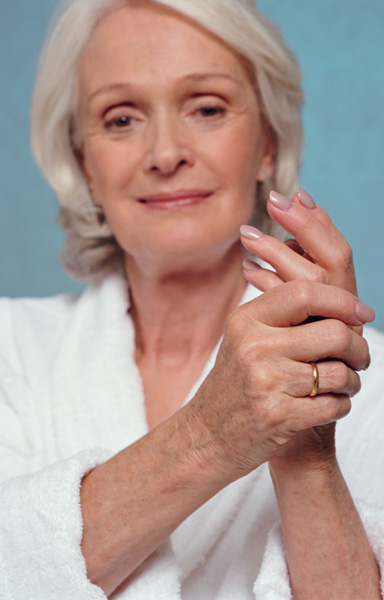
These little brown marks usually appear on the back of the hands, but sometimes on the arms or face as well. You can lighten and possibly reduce them using natural care products—but these treatments require plenty of patience.
Age spots, which are sometimes referred to as “liver spots,” should really be called “sun spots,” as they are actually the result of excessive exposure to the sun.
AGE SPOTS ARE A RESULT OF EXPOSURE TO THE sun’s ultraviolet rays.

It’s possible to conceal age spots with makeup, or there are costly medical procedures such as laser removal. But home remedies are still worth a try.
Test them first on less noticeable places, such as the hands, before using them on your face. Wait a few days to see if you get a reaction and to get an idea of what effect it has on your skin—we’re all different.
• Try applying pure lemon juice to age spots twice a day. Or try buttermilk for a similar effect.
• For an easy-to-make paste to lighten age spots, mix 2 teaspoons (10 g) each powdered ginger and rose petals. Stir 2 teaspoons (10 g) of the mix into a small amount of warm water to make a spreadable paste. Apply to the spots, cover with a cloth and leave for about 30 minutes before rinsing your skin clean.
• Make a natural lightening agent by mixing together about 1 teaspoon (5 ml) each honey and plain yogurt. Spread the mixture on age spots once a day and leave for 30 minutes before rinsing well.
• Rub age spots several times a day with a piece of papaya, or use gels containing aloe vera (from pharmacies), both of which contain substances that stimulate the growth of healthy cells.
Lemon-based lightening agent
1 egg white
2 teaspoons (10 ml) lemon juice
1/2 teaspoon (2 ml) vitamin E oil
Beat ingredients together and spread on age spots. Let work for 20 minutes, then rinse thoroughly. This daily regimen should be repeated over the course of a few weeks to lighten age spots.
• Free radicals contribute to the occurrence of age spots. Ultraviolet radiation plays a role in this, so it’s important to avoid intensive sunlight.
• Add certain vitamins to your diet and avoid alcohol and nicotine, which encourage the formation of free radicals. A well-balanced diet provides the body with nutrients that can combat their effects, such as vitamin C and provitamin A (in fruit and vegetables), vitamin E (in plant oils and grains) and selenium (in nuts, legumes and grains).